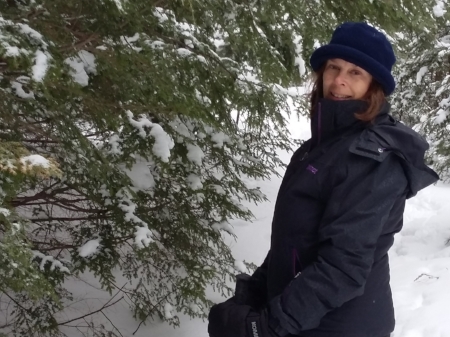On the windowsill by my desk, lying lightly between a prism and a small china bowl, are two black-and-white feathers that to me symbolize courage. It’s crazy how they came to be there—crazy because their significance grew from a personal superstition. They were dropped in our yard by a pileated woodpecker, a grand, lovely bird with a huge bill and a bright red crest.
Twenty years ago I was living quite happily in this house, on an island tucked in piney woods, with Jeff and our young son. My life was exactly as I wanted it. I loved my work, my family, and our home on the Outer Banks. And then, out of the blue, Jeff asked me if I’d be willing to move. There was a job that interested him in another state.
I began waking each morning with a sense of dread.
Sachamama Stargazer www.christinemarsh.com
Quick: In the next 30 seconds, think of all the hats you wear, and the roles you play—parent, child, breadwinner, friend, peacemaker, strong one—and perhaps even write them all down.
Now look over the list and think about which roles you could comfortably step away from. How many of them would you be reluctant to give up? How many cause you to feel overwhelmed?
This is not at all a novel exercise, but it is enlightening. I’ve tried to keep it in mind over the past decade, ever since I encountered it in a book our wonderful adult Sunday school class was reading: Eckhart Tolle’s A New Earth: Awakening to Your Life’s Purpose.
The children were beautiful—eyes shining, hair combed, clean white shirts and gray school uniforms. It was clear that their parents and neighbors wanted them to do well in their classes, here in this simple concrete school deep in the Peruvian Amazon.
It might not have been that way, except for the persistence of an American teacher and a cadre of volunteers who offered the children some simple gifts, over and over, until their lives were changed.
School supplies. Pencils, rulers, notebooks filled with writing paper and graph paper, scissors, colored pens, and more. Also chalk, books, and assorted teaching aids for their classrooms.
Who knew such items could make a difference? I didn’t—not, at least, on so grand a scale. And in seeing what’s possible through a small but significant
Note: This post was originally published Sept. 13, 2017, on the website Tiny Buddha, and you can find that version here.
Over breakfast one morning recently, Jeff and I started reminiscing about past years, and something was said that brought back a painful memory for me. My boss at the time had been unimaginably small-minded. He had hung me out to dry. “I still can’t understand why he did that,” I said.
Jeff looked at me levelly. “You need to get over it, Jan,” he said. “It was years ago.”
Wise advice, without question. The only problem was that I didn’t want it just then.
Why is it that we are so seldom allowed a few moments just to hurt?
Rain was coming—again. In anticipation Jeff and I pulled up our hoods and hunched our shoulders, although we were long past the point where the incessant patter bothered us. It’s supposed to rain a lot in Alaska; that’s why the landscape is so green. I tried not to think about the two weeks of pure sunshine that had preceded our vacation, when I’d been working in Anchorage.
We were taking a short walk to Riley Creek near the campground where we were staying in Denali National Park. Our Alaska explorations had exceeded all our hopes, except for the weather, and we’d made a conscious decision not to mind the clouds and drizzle. At least it wasn’t cold. We’d managed to stay comfortable, except for the night we awoke to find water flowing through our tent. Now the trip was drawing to a close. The following afternoon we’d be leaving for Anchorage and our flight home. We strolled through alder and spruce, past moss and fern, reveling in the moist freshness of the north woods.
To reach the creek we had to pass beneath a high railroad trestle. As we neared it we heard an approaching locomotive. “Let’s go catch it!” I said, and



